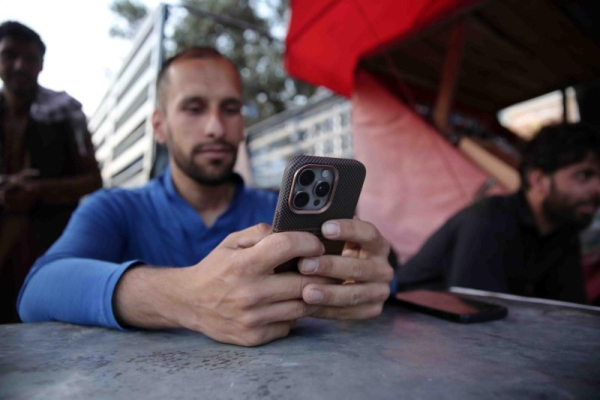

An Afghan man uses a mobile phone as internet and telecom services are gradually restored after almost three days of closures in Kabul Wednesday. Photo by Samiullah Popal/EPA
Internet service was restored in Afghanistan after a two-day blackout that paralyzed the economy and grounded planes.
The lack of Internet created a nearly complete shutdown of services across the country, which included transportation, health care and banking. Cell phone services were also suspended.
The Taliban government, which took over in 2021 after American forces left, has imposed harsh restrictions on freedoms. Afghan officials haven’t responded to questions or said they didn’t know what caused the outage, The New York Times reported.
“I still don’t have the reason for the internet cut off,” Inayatullah Alokozay, spokesperson for the Afghan Ministry of Telecommunications, told The Times.
Sheikh Haibatullah Akhundzada ordered a crackdown on the country’s Internet on Sept. 16. That happened in about half of the country, The Times said. A Taliban governor in Balkh, a northern province, said access was blocked “for the prevention of vices.”
But mobile Internet was still available at that time. On Monday, all telecommunications and Internet shut down.
A man who visited several areas in Kabul on Wednesday told the BBC: “Everyone is happy, holding their cell phones and talking to their relatives. From women, to men and Talibs [members of the Taliban], each was talking on phones after services were restored. There are more crowds now in the city.”
Women in Afghanistan say the Internet is a lifeline since the Taliban banned girls over 12 from education, BBC reported. Jobs for women have been restricted, and in September, universities removed books written by women.
During the shutdown, some faced life-or-death situations. The Times said Jawad Mohammadi, a resident of Mazar-a-Sharif in northern Afghanistan, traveled to Kabul with his brother who needs surgery for kidney stones. But the hospital refused to do the surgery unless he paid up front. Mohammadi, 37, was struggling to gather funds from relatives because the banks were shut down.
“The hospital refuses to proceed with the operation unless we pay in advance,” he told The Times. “I have no other options and don’t know what to do.”